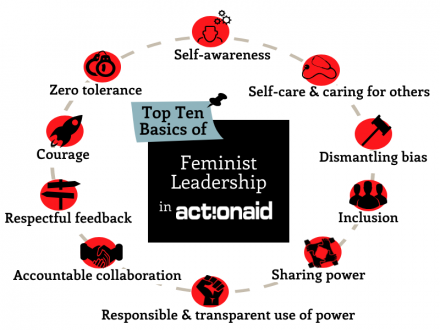At the start of January we shared on social media our New Year’s intention as an organisation, not our aims, strategies or goals, but who we want to be. A kind of self-improvement but for our organisation.
It was: become an example as a feminist organisation, and continue exploring what that means for us, our leadership, our team, our partnerships, our funding, and our work.
What is a feminist organisation?
A feminist organisation is one which works for a gender-equal society. Fundamentally, feminism is about all genders having equal rights, opportunities, and protections. Our feminism and our work is intersectional, which means acknowledging that different forms of discrimination interact and intersect, for example, a woman of colour may have a different experience and different needs from a white woman. According to Terry Mizrahi, feminist values focus primarily on equal rights and opportunity for women while recognising the goal of empowerment. Specific values and ideologies have traditionally been adopted by feminist organisations which make them distinct from other organisations and these include the interconnectedness of problems and solutions while recognising that personal problems have political, cultural, and historical causes and solutions. Feminist organisations value creating a more democratic and egalitarian society by engaging in "the personal is political" and "sisterhood is global" ideologies. (fn1)
What else is a feminist organisation?
For us, being a feminist organisation is not just about the work we do externally to us, it’s also about how we run our organisation internally. Action Aid’s 10 Feminist Leadership principles is certainly a good start for explaining what this might look like.
Action Aid’s 10 Principles of Feminist Leadership
For us, we want to prioritise these principles in our leadership and team working. This means prioritising collaboration and coalition building rather than competition; power-sharing rather than aiming to be the most powerful party in a partnership or space; self-care rather than burnout as a badge of honour; and respect for the differences and needs of different people, rather than a one-size fits all approach.
What does this mean for us?
As we go into 2022, we are continuing to think about what this means for us. Some of the questions we are considering include:
What does truly sharing power with our partners look like?
What does feminist corporate sponsorship look like?
Would a four-day week help promote self-care and caring for others more effectively?
How can we create truly open spaces where staff at all levels feel their opinion is valued?
How do our policies support or undermine our feminist values?
We are learning and developing, and in the spirit of courage, collaboration, and accountability, we look forward to sharing this journey with you.
Share your thoughts in the comments.
Footnote 1: From Benita Bunjun , “Feminist Organizations and Intersectionality: Contesting Hegemonic Feminism”, Atlantis, Vol. 34 No. 2 (2010): Across the Generations in Women's Studies.


